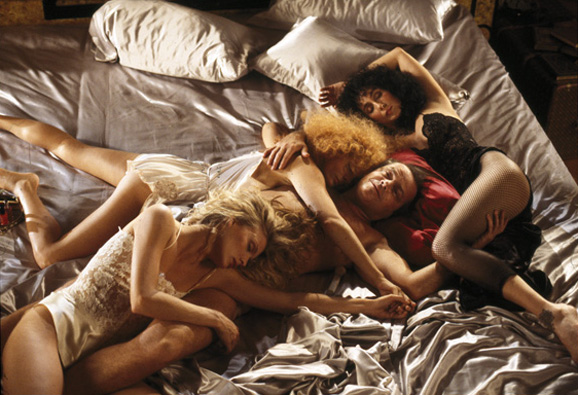
Feminists have traditionally argued that there is a significant double standard between how men and women are judged for promiscuity. Historically, stereotypes of the promiscuous woman have tended to be negative, such as "the slut", while male stereotypes have been more varied, some expressing approval, such as "the stud", while others imply societal deviance, such as "a womanizer". One scientific study found that promiscuous men and women are judged equally harshly and both genders express strong preference for sexually conservative partners. Promiscuity is very often portrayed in literature, cinema and television.
Scientists from the University of California, Berkeley found that deer mice have significantly stronger immune systems than California mice, suggesting that deer mice may have developed more robust immunity to protect themselves against the disease-causing bacteria they are exposed to from mating with multiple partners. The team found that sexual behavior not only impacts the bacteria hosted by each species, but also the diversity of genes that control immunity, according to the study published in the journal PLoS One. After conducting a genetic analysis on the bacterial communities that reside in the vaginas of both species of mice, researchers found that the promiscuous deer mouse had twice the bacterial diversity as the monogamous cousins. Scientists explained that the greater diversity also applied to their genes. After sequencing the genes of the two species of mice, the team found that the deer mouse had much more diversity in DNA associated with the immune system.
Human males are sexually incompatible with human females, who are capable of multiple orgasms. So what is the evolutionary advantage of this? Take monogamy out of the equation, and the evolutionary logic becomes more evident. A woman can have multiple sexual partners. This may increase her chances of reproducing, and she needs to try it a lot to be successful. Compared to other animals, humans have an incredibly low rate of conception, based on the number of sexual acts we partake in.
Scientists have already found a gene that raises the odds of cheating on a partner. They say that when a man or woman with the ‘love rat gene’ has an affair, they receive the same chemical rush as a gambler whose luck has changed or an alcoholic savouring a drink. Researchers quizzed 180 young men and women about their attitude towards relationships and tested them for a gene called DRD4, which affects levels of the brain chemical dopamine. The one quarter or so with the ‘love rat’ version of the gene were more than twice as likely to be unfaithful.
And when they did cheat, they had more one-night stands, the journal PLoS ONE reports. Researcher Justin Garcia said: ‘What we found was that individuals with a certain variant of the DRD4 gene were more likely to have a history of uncommitted sex, including one-night stands and acts of infidelity. ‘The motivation seems to stem from a system of pleasure and reward, which is where the release of dopamine comes in. ‘In cases of uncommitted sex, the risks are high, the rewards substantial and the motivation variable – all elements that ensure a dopamine “rush”.’
Despite the DRD4 gene which could determine how promiscuous you are, there are hormones that promote long term pair bonding. Oxytocin has been known to induce warm feelings, if naturally occurring Oxytocin is best known for its roles in sexual reproduction, in particular during and after childbirth. It is released in large amounts after distension of the cervix and uterus during labor, facilitating birth, and after stimulation of the nipples, facilitating breast-feeding. Possibly males have a similar hormone Vasopressin, important for kidney function and water retention has been linked to long term pair bonding. Despite our ancient ancestry and our close genetic cousins the Bonobo chimps, who are generally promiscuous. Humans have recently adapted to monogamous relationships, hormones like Oxytocin and Vasopressin have changed our genetic instruction to a modern pair boding paradigm. Its hard to say if there is a fight between our genes and our hormones over promiscuity. Though its recently linked that any form of violence is loosely linked to sexuality. The moral issue seems to be guarding the natural order of mans need to procreate in a family setting. This control seems to be be a evolutionary factor, if modern pair bonding will mold us out to sophisticated beings. The fall out will be the violent nature we have for one another due to this transition.




No comments:
Post a Comment